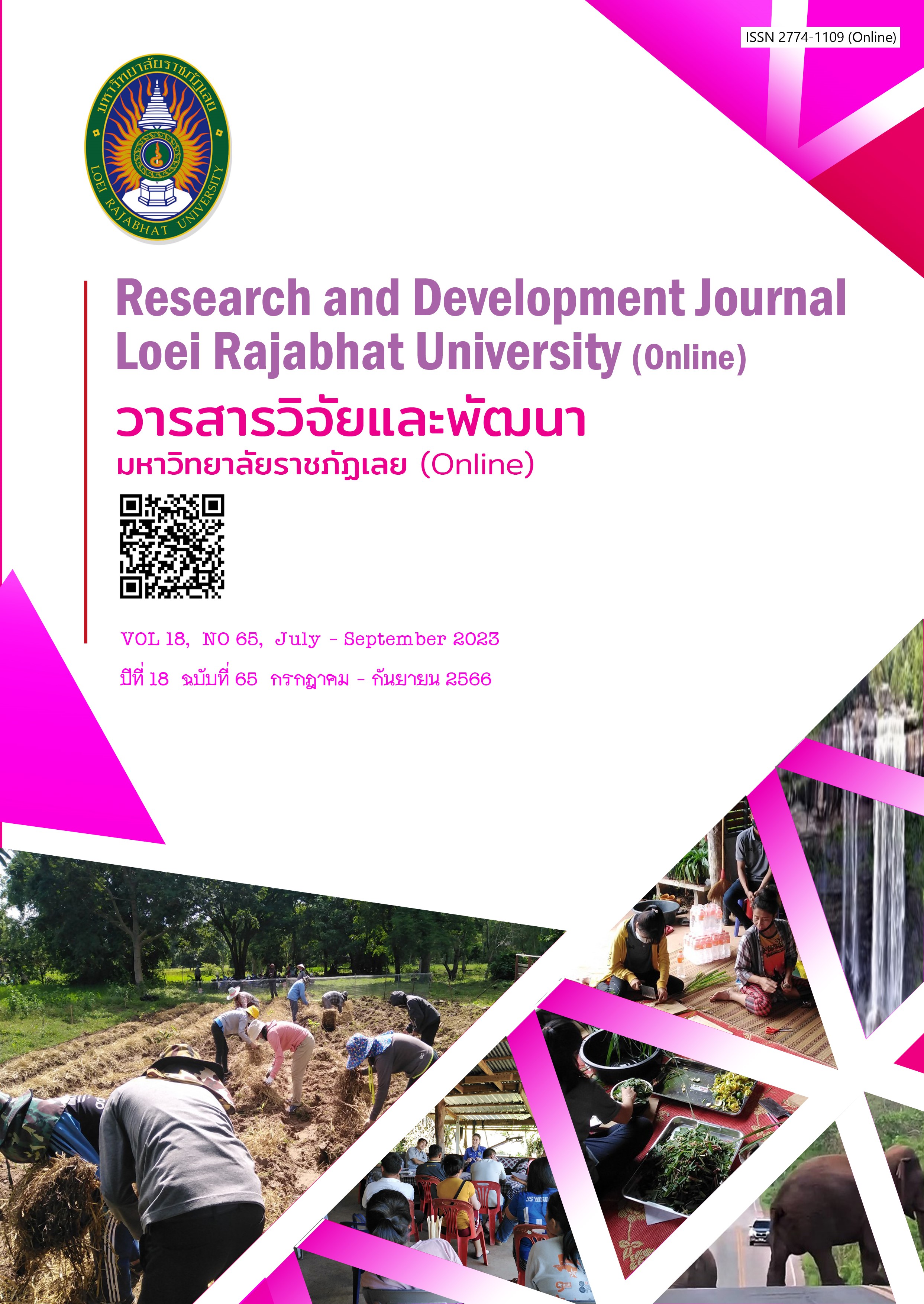Accountant’s Characteristics in the Digital Age Affecting the Achievement of Performance for Juristic Persons in the Northeast
Keywords:
characteristics of accountants in the digital age, accounting professional ethics, achievements of performance, accountants in the digital ageAbstract
The objectives of this research were: 1) to study the characteristics of digital accountants in the performance of juristic persons in the northeastern region; 2) to study the relationship between the characteristics of digital accountants and the performance achievement of juristic persons in the northeastern region; 3) to study the characteristics of accountants in the digital age that affect the performance of juristic persons in the Northeastern region. The sample group consisted of 360 legal entities in the Northeast. The population was obtained by calculating the sample size from the projection table of Krejcie & Morgan. The questionnaire used a 5-level Likert Scale, while data analysis used percentage, mean, and standard deviation. Statistics were used to test the hypothesis correlation and multiple regression analysis. The results showed that: 1) the characteristics of the digital accountant in the practice of juristic persons in the northeastern region were generally at a high level; 2) The relationship between the characteristics of the digital accountant and the performance on the performance of juristic persons in the northeastern region, it was found that the characteristics of the digital accountant were knowledge and accounting professional skills. Accounting Professional Ethics English language skills Account-related legal aspects analytical thinking and problem-solving and information technology had a relationship with the performance of juristic persons in the Northeast at the significance level of .05; and 3) Characteristics of the digital age accountants affecting the performance of juristic persons in the northeastern region found that the characteristics of the digital age accountants accounting professional ethics (β = 4.251) was the highest, followed by accounting professional knowledge and skills (β= 4.131), English language skills (β = 3.673), critical thinking and problem solving (β= 3.673), analytical thinking and problem-solving (β=3.640), accounting-related law (β=3.225), and information technology (β=2.572), respectively.
References
กุลธิดา ธนสมบัติศิริ และ ดารณี เอื้อชนะจิต. (2565). คุณลักษณะของนักบัญชียุคใหม่ที่ส่งผลต่อประสิทธิภาพการทำงานของนักบัญชีในสำนักงานรับทำบัญชีในเขตกรุงเทพมหานครและปริมณฑล. วารสาร มทร.อีสาน ฉบับมนุษยศาสตร์และสังคมศาสตร์, 9(2), 12-23.
จิตติมา ขำดำ. (2562). ความรู้ความสามารถของนักบัญชีและความเข้าใจในมาตรฐานการจัดทำบัญชีภาครัฐที่มีผลต่อประสิทธิภาพงานบัญชีของสำนักงานอัยการสูงสุด. วารสารนักบริหาร, 39(2), 52-65.
จิตรเลขา ทาสี, บัณฑิต ร่มเย็น และ นพวรรณ ทองรอด. (2563). คุณลักษณะของนักบัญชีที่พึงประสงค์ของผู้ประกอบการในเขตกรุงเทพมหานคร. วารสารรัชต์ภาคย์, 14(37), 94-108.
ชลิดา ลิ้นจี่, กนกมณี หอมแก้ว, และสุภาพร บุญเอี่ยม. (2563). ความรู้และทักษะวิชาชีพของนักบัญชีสำนักงานบัญชีคุณภาพในประเทศไทย. วารสารศิลปะการจัดการ, 4(1), 34-45.
ณัฏฐ์รมน ศรีสุข. (2565). สมรรถนะทางการบัญชีสมัยใหม่ที่มีผลต่อ ความสำเร็จในการปฏิบัติงานของผู้ทำบัญชีในพื้นที่ จังหวัดนนทบุรีและกรุงเทพมหานคร (การศึกษาค้นคว้าอิสระปริญญามหาบัณฑิต). มหาวิทยาลัยศรีปทุม, กรงเทพฯ.
ธานินท์ ศิลป์จารุ. (2557). การวิจัยและวิเคราะห์ข้อมูลทางสถิติด้วย SPSS และ AMOS (พิมพ์ครั้งที่ 15). กรุงเทพฯ: บิสซิเนสอาร์แอนด์ดี.
บุญชม ศรีสะอาด. (2560). การวิจัยเบื้องต้น (พิมพ์ครั้งที่ 4). กรุงเทพฯ: สุรีวิยาสาสน์.
ลลิตา พิมทา และ บุญช่วง ศรีธรราษฎร์. (2562). ผลกระทบ ของจริยธรรมทางการบัญชีที่มีต่อความสำเร็จในการ ทำงานของนักบัญชีบริษัทในจังหวัดร้อยเอ็ด. วารสารการจัดการธุรกิจ มหาวิทยาลัยบูรพา, 8(2), 119-141.
สร้อยเพชร ลิสนี และ บุตรศรินทร์ แสงสว่าง. (2564). แนวทางการพัฒนาคุณลักษณะของนักบัญชียุคดิจิทัลที่ส่งผลสัมฤทธิ์ต่อการปฏิบัติงานของนิติบุคคลในจังหวัดกาญจนบุรี. วารสารสภาวิชาชีพบัญชี, 3(9), 34-48.
Bunyawut, S., and Intakhan, P. (2016). The Study of new generation characteristics of accountants under the ASEAN community. Journal of Modern Management Science, 9(1), 167-177.
Federation of Accounting Professions. (2021). Accounting Professions Act. Retrieved from https://www.tfac.or.th/Article/Detail/66888
Krejcie, R, V., and Morgan, D.W. (1970). Determining Sample Size for Research Activities. Educational and psychological measurement, 30(3), 607-610.
Laksana, S. (2003). Development of work efficiency (3rd ed). Bangkok: Thanarat Publication.
Office of the Permanent Secretary Ministry of Commerce. (2019, 20 December). List of Export-importers. Retrieved from http://www2.ops3.moc.go.th/ie/Manage_User.aspx
Pornpipatkul, W. (2021, 18 May). Accountants Management in the Digital Age. Retrieved from https://www.tfac.or.th/Article/Detail/126283.
Rodjam, C., and Mungsing, R. (2019). A Confirmatory Factor Analysis of Accountants’ Competency in Desirable Accountants’ Qualifications. Journal of Humanities and Social Sciences, Rajapruek University, 5(1), 29-44.
Theingtrakul, A. (2014). Professional Knowledge, Professional Skills and Professional Values of Certified Public Accountant Under International Standards on performance with Affecting Operation of Industrial Goods and Technology Group Users in the Stock Exchange of Thailand. Bangkok: Dhurakij Pundit University.
Upradit, A. (2018). The Relationship of Accounting Professional Ethics toward Performance of Bookkeeper in Lampang Province. Journal of Faculty of Applied Arts, King Mongkut’s University of Technology North Bangkok, 11(1), 81-91.
Downloads
Published
How to Cite
Issue
Section
License
Copyright (c) 2023 Research and Development Journal, Loei Rajabhat University

This work is licensed under a Creative Commons Attribution-NonCommercial-NoDerivatives 4.0 International License.
ข้อความที่ปรากฎในวารสารฉบับนี้เป็นความคิดเห็นของผู้เขียนแต่ละท่าน สถาบันวิจัยและพัฒนา มหาวิทยาลัยราชภัฏเลย และกองบรรณาธิการ ไม่จำเป็นต้องเห็นด้วยและไม่มีส่วนรับผิดชอบใดๆ
สถาบันวิจัยและพัฒนา มหาวิทยาลัยราชภัฏเลย ขอให้ผู้อ่านอ้างอิงในกรณีที่ท่านคัดลอกเนื้อหาบทความในวารสารฉบับนี้






